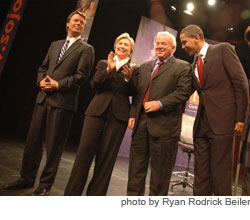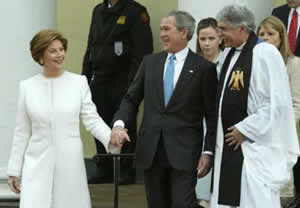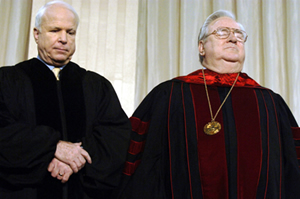The Prophet Amos to the Priest Amaziah:
Stop Pimping Religion for Political Empire
For Sunday July 15, 2007
Lectionary Readings (Revised Common Lectionary, Year C)
Amos 7:7–17 or Deuteronomy 30:9–14
Psalm 82 or Psalm 25:1–10
Colossians 1:1–14
Luke 10:25–37
 |
Sojourner's Jim Wallis hosts Democratic presidential candidates. |
Is America an empire? The new Rome? And if it is, what role ought Christians to play?
I like Cullen Murphy's approach in his book Are We Rome? (2007). He says that "in a thousand specific ways, the answer is obviously no. In a handful of important ways, the answer is certainly yes." He explores six parallels of "direct relevance" between ancient Rome and modern America.
America and Rome both suffer from an exaggerated sense of exceptionalism. Expansive militarism also characterizes both societies. Today, for example, America has 700 bases in 60 countries, and in any one year will conduct "operations" of some sort in 170 countries. In both Rome and America Murphy sees "the deflection of public purpose by private interest." Both empires view people who live outside of their orbit with patronizing condescension, as inferiors. Fifth, Murphy explores the idea of borders, both literal and figurative. Finally, in his epilogue he wonders whether the "inherent complexity" of over-extended empires like Rome and America make them ungovernable.
As I read Murphy's book and the prophet Amos this week, my mind kept ricocheting between modern America, imperial Rome, and ancient Israel. Amos wrote 2,800 long years ago, but his prophecy reads like today's newspaper. He lived under the renowned king Jeroboam II, who reigned forty-one years (786–746 BC) and forged a kingdom characterized by territorial expansion, aggressive militarism, and unprecedented economic prosperity.
Many Hebrews of that day interpreted their fine times as God's special favor upon them. Amos says that people were intensely and sincerely religious. But theirs was a privatized religion that ignored the poor, the widow, the alien and the orphan, and that degraded faith to culturally acceptable ritual. Worst of all, and herein lies a seventh characteristic of empires that Cullen Murphy doesn't consider—Israel's religious leaders sanctioned the political and economic status quo; they pimped their religion for Jeroboam's empire.
Enter Amos. He preached from the lunatic, pessimistic, and unpatriotic fringe. He was blue collar rather than blue blooded. He says that he was neither a prophet nor even the son of a prophet in the professional sense of the term. He was a shepherd, a farmer, and a tender of fig trees, a small town boy who grew up in Tekoa, about twelve miles southeast of Jerusalem and five miles south of Bethlehem. The cultured elites of his day despised Amos as a redneck. Furthermore, he was an unwelcome outsider. Born in the southern kingdom of Judah, Yahweh called him to thunder a prophetic word to the northern kingdom of Israel.
 |
George Bush leaves church. |
And that's just what this coarse, rough hewn prophet did. His fiery rhetoric opposed the powers of his day. With graphic details that make you wince, he describes how the rich crushed the poor; the affluent with their expensive lotions, elaborate music, and vacation homes with beds of inlaid ivory; sexual debauchery where a man and his son abused the same woman; a corrupt legal system that sold justice to the highest bidder; predatory lenders who exploited vulnerable families; and religious leaders who aided and abetted all of this.
This week's reading from Amos 7:7–17 relates one of the most dramatic encounters in all of Scripture. The text ought to come with warning labels like "not recommended for children," or "side effects include severe political discomfort." To the priests who defended, legitimized, and justified Jeroboam's political power, Amos delivered an uncompromising word of warning.
After Amaziah the priest told Jeroboam the king that Amos's preaching was unpatriotic and conspiratorial, he tried to run him out of town. “Get out, you seer! Go back to the land of Judah. Earn your bread there and do your prophesying there” (7:12). Then Amaziah said something that reveals just how completely he had identified religious faith with political power. It ought to send a chill up the spine of every religious leader who ever thought about sucking up to political power: "Don't prophesy anymore at Bethel, because this is the king's sanctuary and the temple of the kingdom" (7:13). With those words the religious justification of political empire is complete, and faith is reduced to patriotic cheer-leading.
But Amos wouldn't be bullied; he had a word of his own for every priest who prostituted religion for empire: "Your wife will become a whore, your kids will be violently murdered, enemies will carve up the country, you will die far from home, and pagan Assyria will devour the political and economic empire you have sanctioned in God's name" (7:17).
The church has a checkered history in its relationship to the state. Many have followed in the footsteps of Amaziah and traded religious legitimation for security, power and privilege—the German Christian movement that supported Nazi ideology, the Dutch Reformed church that supported apartheid in South Africa, and Russian Orthodox priests who collaborated with the Soviet KGB. The Archbishop and martyr (he was assassinated in 1980) of San Salvador, Óscar Romero, wrote a letter to President Jimmy Carter that he could have sent to any number of our commanders in chief: "You say that you are Christian. If you are really Christian, please stop sending military aid to the military here, because they use it only to kill my people."
 |
Senator John McCain and Jerry Falwell. |
Romero is only one of many brave saints who followed the path of Amos over Amaziah—the Confessing Church in Germany that opposed Hitler, nationalism, and anti-Semitism; the black pentecostal pastor Frank Chikane who in 1985 gathered more than 150 clergy from 20 denominations to draft the Kairos Document that protested South African apartheid; father Gleb Yakunin who has insisted that the Russian Orthodox Church publicly repent of its ties to the Soviet regime; the culturally marginal and politically powerless Quakers who helped to abolish the British slave trade in the 19th century; Morgan Tsvangirai who has sought "divine intervention" to end Robert Mugabe's three decades of brutality, catastrophic policies, and gross incompetence in Zimbabwe; and the Jesuit priest Daniel Berrigan (b. 1921) who spent considerable time in prison for his civil disobedience against American policies on racism, nuclear proliferation, and Vietnam (he is also pro-life). When asked by Nora Gallagher how many times he had been jailed for resisting caesar, Berrigan responded, "Not enough."
Dan's younger brother Phil (1923–2002), also a Catholic priest, was arrested more than 100 times and served a total of 11 years in prison for acting on his conviction that the good news of Jesus constituted a higher law than the demands of the state: "It's spelled out in Scripture, it could not possibly be more clear. It's spelled out in the wisdom of Isaiah, with its injunction to beat swords into plowshares and to learn war no more. To be acceptable to God, it says, we must forsake our weapons, destroy them, live as brothers and sisters in peace and love. Christians do not hate, Christians do not kill, Christians love their enemies. It's difficult. . . But I do know that being a Christian is about non-violence. It's about justice. It's about being outraged at the way we destroy each other." In the language of this week's reading, it's about choosing Amos over Amaziah.
For further reflection:
* How has the church legitimated political and economic power?
* Consider believers who've followed Amos rather than Amaziah.
* To what extent should a Christian support the laws and policies of its nation?
* Consider this conundrum: Jesus calls his followers to do something that states cannot and should not do: love our enemies and place their needs above our own.
* Consider Gregory Boyd, who writes in The Myth of a Christian Nation: "the path through politics is not the road to God."
* On American empire see the trilogy by Chalmers Johnson: Blowback (2000), The Sorrows of Empire (2004), and Nemesis: The Last Days of the American Republic (2007).





